Entertainment
The Widow Assessment. Mar├Ła Irene Forn├®s first play ŌĆō New York Theater
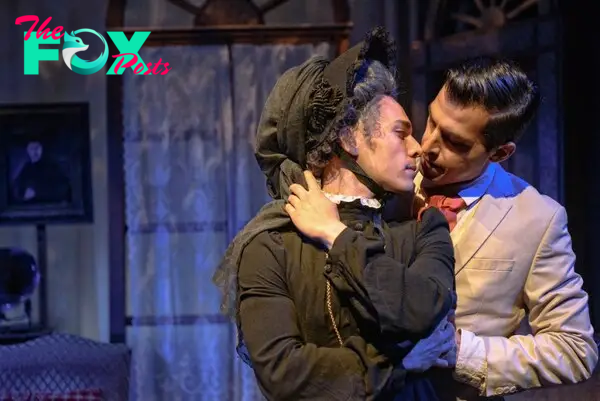
Mar├Ła Irene Forn├®s was a thirty-year-old aspiring New York painter visiting kin in her native Cuba together with her then-lover Susan Sontag, when she stumbled upon a cache of outdated letters. They launched her prolific and iNFLuential profession as a playwright.┬Ā
The letters had been written to her great-grandfather in Cuba from a cousin dwelling in exile in Spain on the finish of the nineteenth century.
The play these letters impressed, ŌĆ£La Viuda,ŌĆØ is receiving its first-ever English translation,┬Ā┬Āas ŌĆ£The Widow,ŌĆØ greater than sixty years after its Spanish-language debut, in a first-rate manufacturing by a brand new Off-Broadway theater firm.
ŌĆ£The WidowŌĆØ is arguably about forbidden love, with an ethical lesson that’s not concerning the wages of sin, however relatively the worth of propriety.┬Ā┬ĀIt is usually concerning the sacrifices made for liberty, as illustrated by a number of disruptive moments in Cuban historical past.
However those that know Forn├®s, who was a number one determine within the downtown experimental theater scene for many years,┬Ā┬ĀreceivedŌĆÖt be shocked to be taught that such themes have to be discerned (or guessed at?) by means of the opaque scrim of the playŌĆÖs unconventional storytelling . ŌĆ£I’ve by no means as soon as in writing a play,ŌĆØ she as soon as mentioned, ŌĆ£given a considered what the sceneŌĆÖs about or what I wish to say to the viewers.ŌĆØ
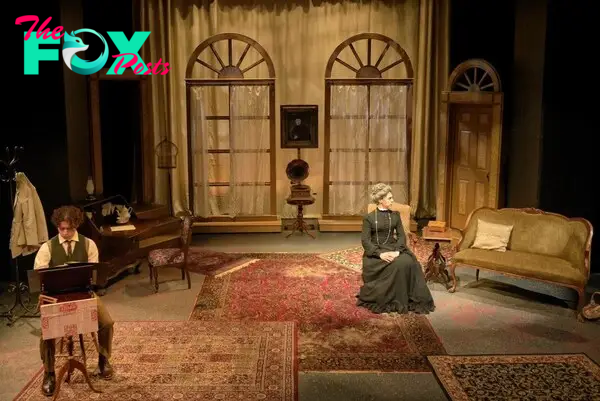
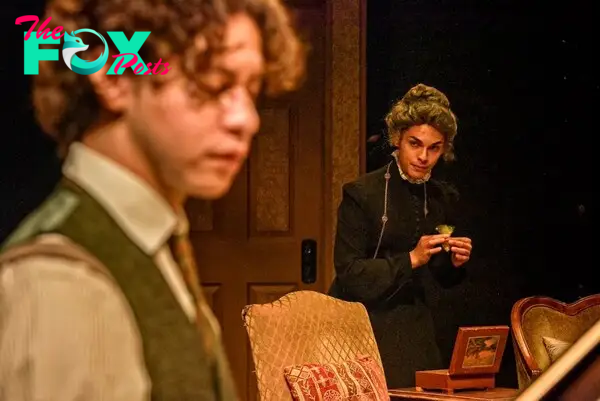
ŌĆ£The WidowŌĆØ begins with Angela Martin at 70 years outdated (portrayed, per Forn├®s suggestion, by a male actor, standout Jay Romero.)
In a chic room in her residence in Seville, Spain, Angela dictates letters to a silent clerk (Zeph Santiago.) The letters are supposed for AngelaŌĆÖs cousin David (by no means seen) again in Cuba. Angela is asking David to inquire concerning the well being of her husband,┬ĀFrancisco de Arenal, however to make the inquiries discreetly: ŌĆ£I need to keep a reserve of propriety in all that considerations this rabble.ŌĆØ┬Ā
It’s 1899, after┬Āthe Spanish-American Struggle led to the U.S. occupation of a newly unbiased Cuba.┬Ā┬ĀWe quickly be taught that Angela had left Cuba ŌĆō and her husband ŌĆö for Spain three many years earlier, searching for security throughout one other battle, the Ten Years Struggle,┬Ā┬Āwhen┬ĀCubans fought for independence from Spain.
Angela initiated her correspondence as a result of she heard that Arenal (whom she calls Paco) has suffered a stroke; she is also within the rental properties she nonetheless owns in Cuba, and whether or not the modified political scenario will enhance the financial image.┬Ā┬Ā
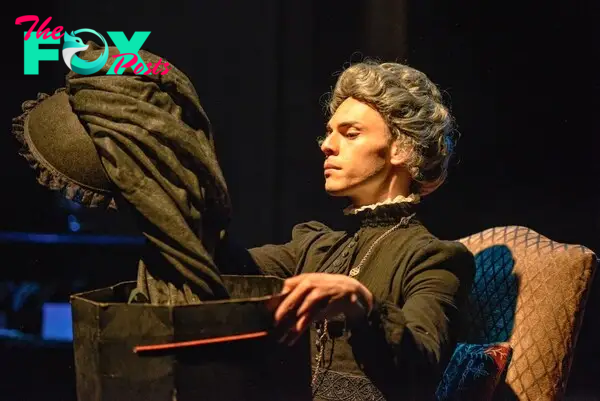
A bit of later, David informs Angela that Paco has died. As AngelaŌĆÖs correspondence continues over the following a number of years, we be taught that she is consumed with outrage that Paco took a brand new spouse, with whom he had many kids. She insists she continues to be his spouse, and calls for to be listed as such in his obituary; divorce is just not authorized in Spanish or Cuban society. However, David tells her, Paco grew to become a citizen of the USA, the place divorce is authorized.
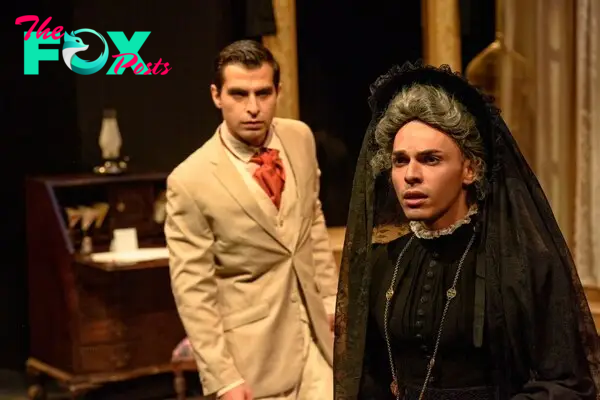
The scenes of AngelaŌĆÖs letter-writing alternate with flashbacks with characters from her previous, together with younger Angela herself, and Paco (Jesse Mu├▒oz), who as a crusading journalist and revolutionary got here into battle with AngelaŌĆÖs rich father Don Modesto (Fidel Vicioso, who additionally performs AngelaŌĆÖs priest.)
We additionally see their son Salvador at each age 5 and 25, a neighborhood gossip, and a few male admirers. It will definitely turns into clear ŌĆō to me, anyway ŌĆō that Angela is an unreliable narrator,┬Ā┬Ādefinitely not the character with whom we’re inspired to establish. ŌĆ£They inform me his well being couldnŌĆÖt bear the disgust of witnessing the arrival of the People in Cuba,ŌĆØ Angela says of Paco at one level. ŌĆ£However I imagine it’s the sickness of a remorseful conScience for having lived like a libertine.ŌĆØ
ItŌĆÖs simple to argue that Forn├®s, who needed to cover the character of her relationship with Sontag on her go to to Cuba, is most definitely to have recognized with Paco, a libertine maybe within the eyes of typical moralists of the period, however one devoted to like and to liberty.┬Ā
The efficiency I occurred to attend of ŌĆ£The WidowŌĆØ had an viewers pretty stuffed with nine-year-olds. They had been all apparently college students on the Triple Promise Academy for the Performing Arts based mostly in Bay Ridge, there to root for one in every of their classmates, who performs Little one Sebastian. I used to be impressed how attentive they had been, with solely minimal fidgeting and whispering, and I questioned whether or not Forn├®sŌĆÖ performs are extra accessible than I’ve given them credit score for.┬Ā┬Ā
within the years since her demise in 2018 on the age of 88, her work has acquired renewed consideration, with lovingly produced current revivals of ŌĆ£Promenade,ŌĆØ her 1965 satirical musical with composer Al Carmines, ŌĆ£Fefu and her Associates,ŌĆØ her pioneering immersive and ŌĆ£pro-feminineŌĆØ 1977 play, and ŌĆ£Sarita,ŌĆØ her 1984 darkish musical about an exploited teenager, all of which I loved, and didnŌĆÖt really feel the necessity to perceive totally.
ŌĆ£The WidowŌĆØ continues in that current custom, the primary manufacturing of┬ĀThe Dogteam Theatre Challenge, a brand new firm that matches skilled theater makers with theater college students from Middlebury Faculty. Late within the play, your entire solid one by after the opposite serenely and surreally don elaborate mourning veils that drop from the ceiling, identical to the one Angela has been sporting. I canŌĆÖt clarify why, nevertheless it felt precisely proper.
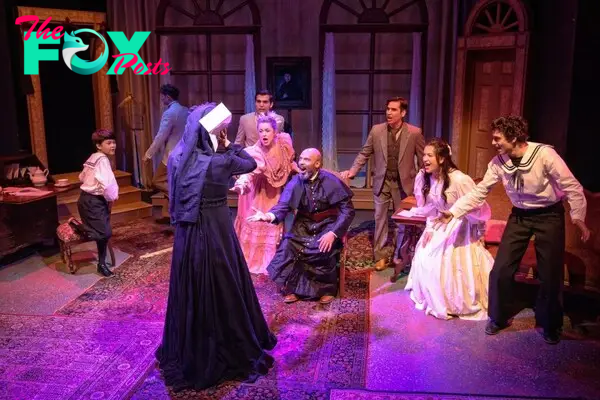
La Viuda┬Ā(The Widow)
Dogteam Theater Challenge at Atlantic Stage 2 by means of August 4
Working time: 80 minutes with no intermission
Tickets: $33.85 ($23.18 for college kids, seniors and army)
Written by Mar├Ła Irene Forn├®s┬Ā
Translated and directed by Olga Sanchez Saltveit┬Ā
Scenic design by Mark Evancho, costume design by Summer season Lee Jack, lighting design by Calvin Anderson, sound design by Madison Middleton
Solid: Jay Romero as Angela, Zeph Santiago as The Clerk, Jesse Mu├▒oz as Francisco de Arenal, Fidel Vicioso as Fr. Cravet/Modesto, Katelyn Wenkoff as Good Angela, Jacob Joseph Medina as Younger Salvador, Zack Maluccio as Salvador, Bri Seashore as Moncita, Jose-Maria Aguila as Manuel, Ethan Fleming as Casimiro Paz
Associated
-

 Entertainment10h ago
Entertainment10h agoBeyonce to Headline Halftime Show During NFL Christmas Game
-

 Entertainment11h ago
Entertainment11h agoDid You Correctly Answer This Poughkeepsie Related Jeopardy Question?
-
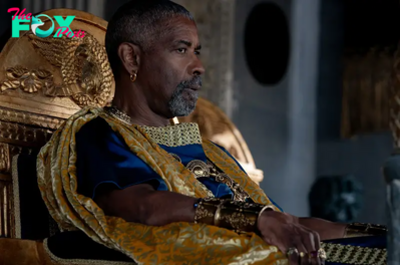
 Entertainment16h ago
Entertainment16h agoWhat to Know About Denzel WashingtonŌĆÖs Gladiator II Character
-

 Entertainment17h ago
Entertainment17h agoChanges Made in New York to ŌĆ£Men WorkingŌĆØ Construction Signs
-

 Entertainment1d ago
Entertainment1d agoRemembering Song Jae-rim: A Look at His Best Movies and K-Drama Performances
-

 Entertainment1d ago
Entertainment1d agoAmerica On CoffeeWeŌĆÖre simply inviting you to take a timeout into the rhythmic ambiance of our breakfast, brunch and/or espresso alternatives. WeŌĆÖre pleased everytime you cease by.SELF CONTROL
-

 Entertainment1d ago
Entertainment1d agoOrange County Choppers Is Ready For Its Big Comeback
-

 Entertainment1d ago
Entertainment1d agoThe Real Story of Geta and Caracalla, the Roman Brother Emperors in Gladiator II

























